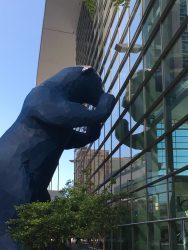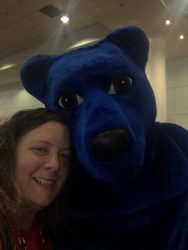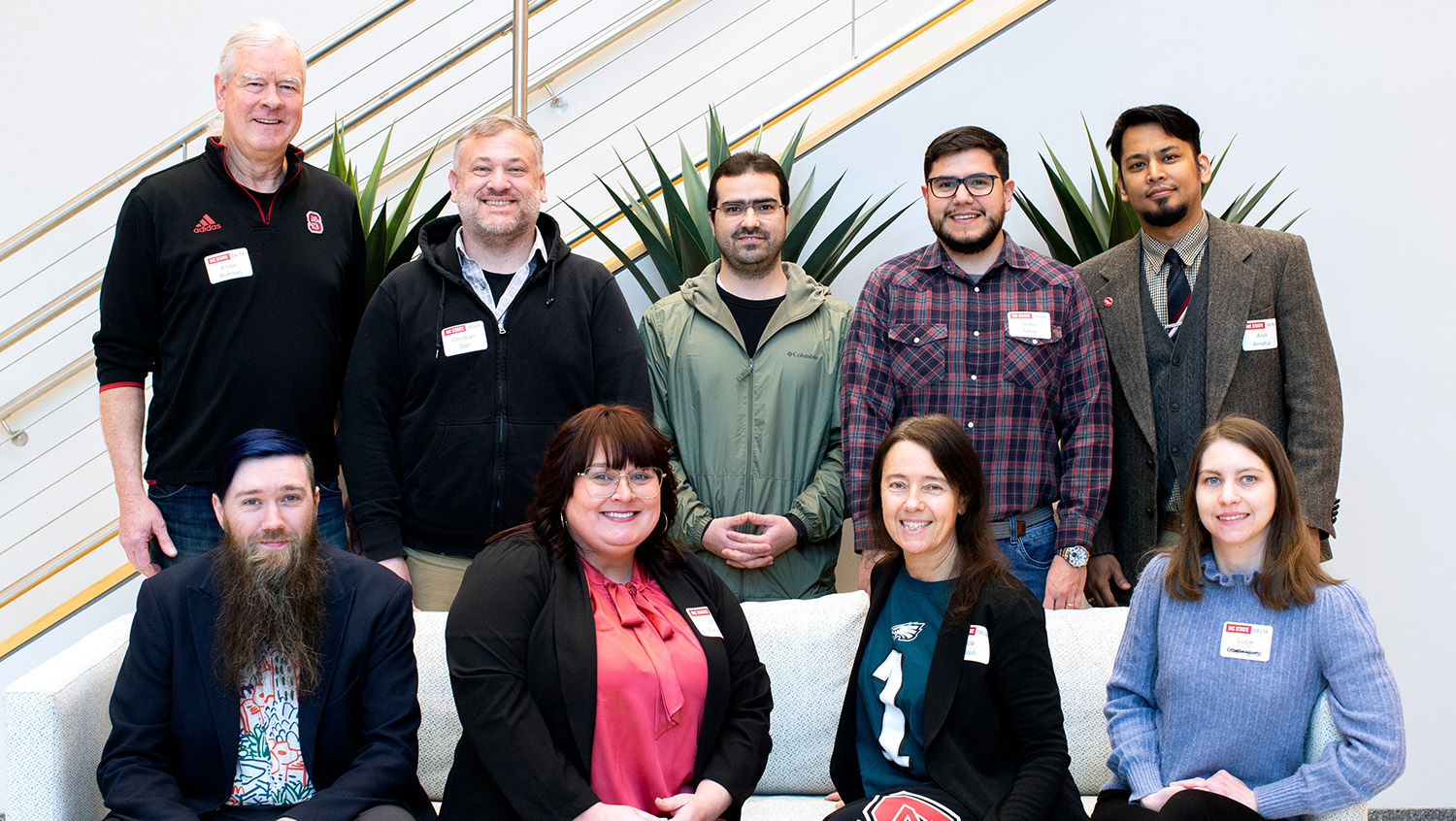A Recap from the ATD Conference
Suzanne Edmonds had the opportunity to attend the Association of Talent Development (ATD) International Conference and Exposition in Denver, Colorado from May 22 through May 25. Highlights from various sessions and keynotes are included in this article, along with a few fun pictures!
Notes from the Keynotes
Simon Sinek spoke about leadership in the workplace, and what true leadership looks like. He started by asking what the true definition of leadership is…and responded with something that had the entire room nodding along. He stated that everyone has a different idea and opinion of what a leader is, and that’s the problem. There is no one description of a leader, but there are multiple qualities that make up a leader. Two of the top qualities are trust and cooperation; and when these two qualities are present, there should be less cynicism, mistrust, self-interest, and paranoia. In addition, leaders must trust their employees to do the job for which they’ve been trained; otherwise, no one benefits. Simon also threw around terms such as endorphins, dopamine, serotonin, and oxytocin to help us understand the incentivized system within the human body. To close out his keynote speech, Simon discussed making the transition from MANAGER to LEADER. Leadership is not about being in charge; it’s about taking care of those IN your charge. It is the practice of many little things, and consistency is more important than intensity. And finally, leadership is a choice, a daily practice; it is something that is taught.
Brené Brown also spoke about leadership, but in a different way. She focused her speech around courage. She mentioned that there are four pieces of courage: vulnerability, clarity of values, trust, and rising skills. Also, courage is teachable – you can teach people to show up and be seen, even when you can’t control the outcome – but it’s certainly not an easy task. The differences between courage and comfort were also a key point; a leader must either choose courage or comfort, because having both is not a possibility. If one chooses comfort over courage, they shouldn’t be a leader. Brené closed out her speech by giving us a mnemonic device to remember when trust is an issue. Think of the term BRAVING: Boundaries, Reliability, Accountability, Vault, Integrity, Non-judgement, and Generosity.
On the final day, Jeremy Gutsche was the keynote speaker. Jeremy spoke about awakening our “hunter.” He mentioned that the secret to remarkable success is hard work and an overlooked opportunity. There were 5 notable phrases that came from this speech: 1) Your competitors are lazier than you think; 2) Everyone wants to get better and faster, but not everyone puts in the effort; 3) We’ve reached a time when the act of getting inspired is overwhelming; 4) Chaos creates opportunity; and 5) We repeat whatever led to last year’s harvest. After discussing these in a bit more detail, he left us with 3 ideas on the ways to increase the “hunter” in all of us: acceleration: rethinking about what people actually want; divergence: opposing a mainstream fuels success and chaos creates predictable opportunity; and convergence: innovation is a little iteration — you don’t need one big idea, you need one small idea that you can make BIG. The CEO of Omnicom once stated that Jeremy is “an intellectual can of Red Bull” and he was spot on with that comment! Not only was Jeremy the final keynote of the session, he was also the final session of the entire conference. Imagine how tired all the participants were after four or more days of full learning opportunities…Jeremy was the perfect end because he kept things lively, and the participants on the edge of their seats!
*Note: If you would like to read more about any of the keynote speakers or watch their videos, please click on the speaker names above.
Because this conference was so large (10,000+ participants, and 300+ sessions), it would take too long to list out each specific session with their key takeaways. As a result, I have compiled some of the highlights from various sessions I attended that may have the most impact for me, and my work.
Spotlights from the Sessions
- My very first session (and one of the most interesting sessions) was led by Marc Rosenberg. “The Best Training is No Training” helped me think about the training my team and I provide. Some things I will keep in mind are as follows:
- Nine principles of training:
- Training matters less; performance matters more.
- Training is not the universal band-aid.
- More technology doesn’t make it better…but it can make it worse.
- Training is the last alternative, not the first.
- The more proficient people are, the less training they need.
- Getting closer to the work means getting farther from training.
- Reduce the catalog rather than expand it.
- Change the conversation.
- When you do train, it better be great.
- What makes training great: Accurate, Authentic, Engaging, It Works, Meaningful, Supported, Timely, Transferable, Worthwhile, and Necessary.
- Nine principles of training:
- One of the most fun sessions was, “From Lacking the Swagger to Moves Like Jagger” by Rick Lozano. This session focused on five words/topics (that revolve around each other), and will be expanded upon here.
- Engagement: the way we feel about the way things work (there is a difference between “showing up for work” and “getting lost in it”).
- Culture: the way things work (and get done); create a culture that enables engagement by trust, leadership, and policy.
- Individual: engagement lives in the experience of the individual; motivation plays a key role here!
- Creativity: create a mindshift; creativity begets innovation; build creativity into workforce planning; creativity is a driver of engagement.
- Growth: look at people’s strengths; stop looking at growth as a ladder; people are engaged because they’re growing, and growing because they’re engaged — it’s a balancing act!
- One of the most applicable sessions came from Bob Pike, titled, “Becoming a Master Trainer: Tips, Tactics, & Techniques for Getting Results from Your Training.” During this session, there were quite a few things that stuck out to me, mentioned below.
- Training is a process, not an event; it starts before training takes place, and continues long after training is over.
- 90/20/8
- Listen to understand = 90 minutes
- Listen to retain = 20 minutes
- Involve EVERY 8 minutes (this is why tv shows break about every 8 minutes)!
- Best way to implement the 90/20/8 rule:
- Need to know (about 50% of the content covered)
- Nice to know (30% of content may be resources)
- Where to go (20% of content is references)
- Closing the program
- Closing ACT (most trainers run out of time, not actually close the session)
- Effectively close the session by: Action planning, Celebration, and Tie things together (ACT)
- One of the worst things you can do to close the program is to have the participants complete evaluations!
- Revisit, NOT review the material: Reviewing the content means the instructor does it, but revisiting the content means the participants do it.
- One of the most rewarding sessions was led by two people who work at Google; this was also one of fullest sessions — did you know that everyone wants to work for Google? This session was titled, “Influencing Culture through Technical Training”, and the presenters were Julia Wilkowski and Phil Wagner. This session was both interactive and engaging, but ironically, I took the least amount of notes in this session! A few key concepts I found important are included below.
- Great work culture doesn’t happen by accident
- Culture informs training.
- Training influences culture
- Transparency is a key factor (Thankfully, DELTA succeeds on this!)
- Google’s Technical Culture
- Data-driven
- Launch and iterate
- Think like an owner
- Use memes
- During this session, each table was tasked with discussing their current work culture — the strengths, weaknesses, and concerns. After speaking with others at my table, it’s clear to me that our organization does REALLY well with this, and that made me proud, especially based on the other words I heard during this discussion: words like toxic and confusing. So, thank you, DELTA, for doing it the right way!
- Great work culture doesn’t happen by accident
While there are many other sessions I attended, these were by far my favorite, and the ones I learned the most from. The 2016 ATD Conference was a bit overwhelming, but Denver was beautiful, and it was an experience I’ll never forget!




- Categories:


